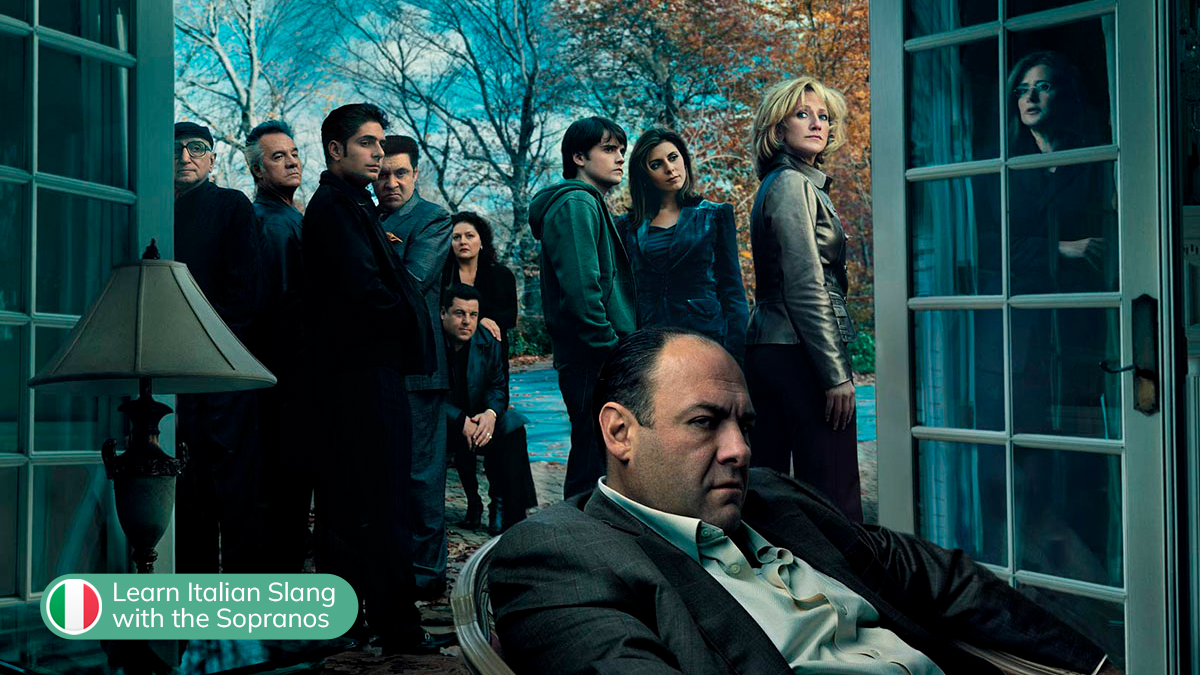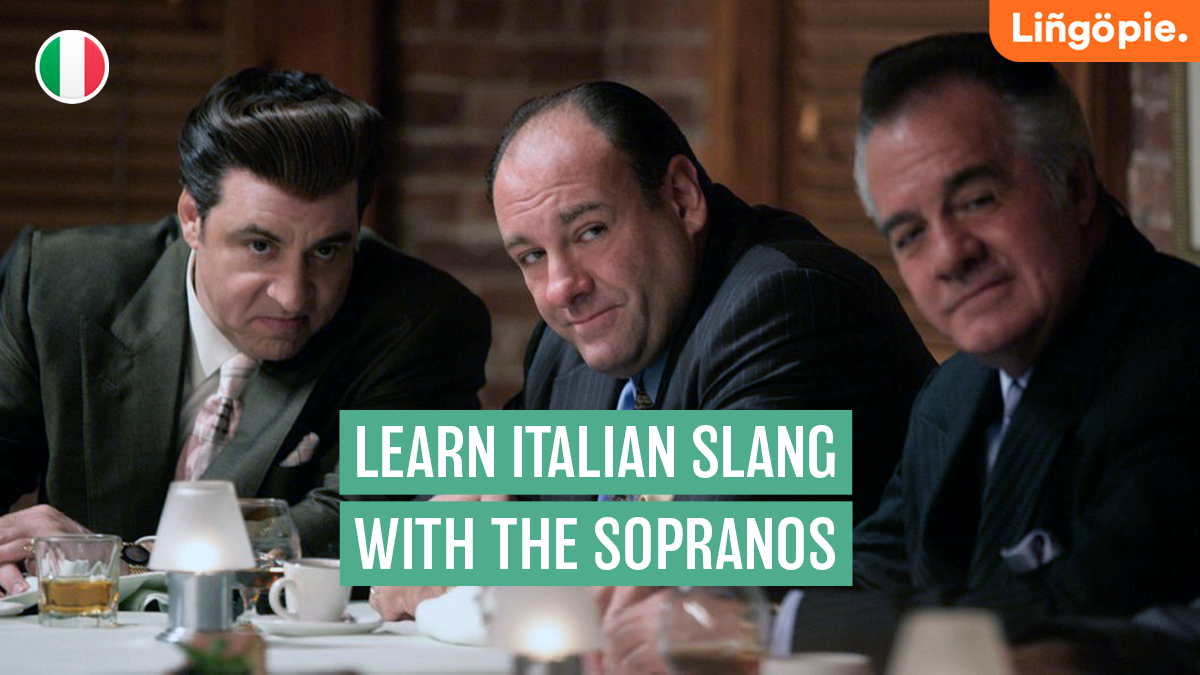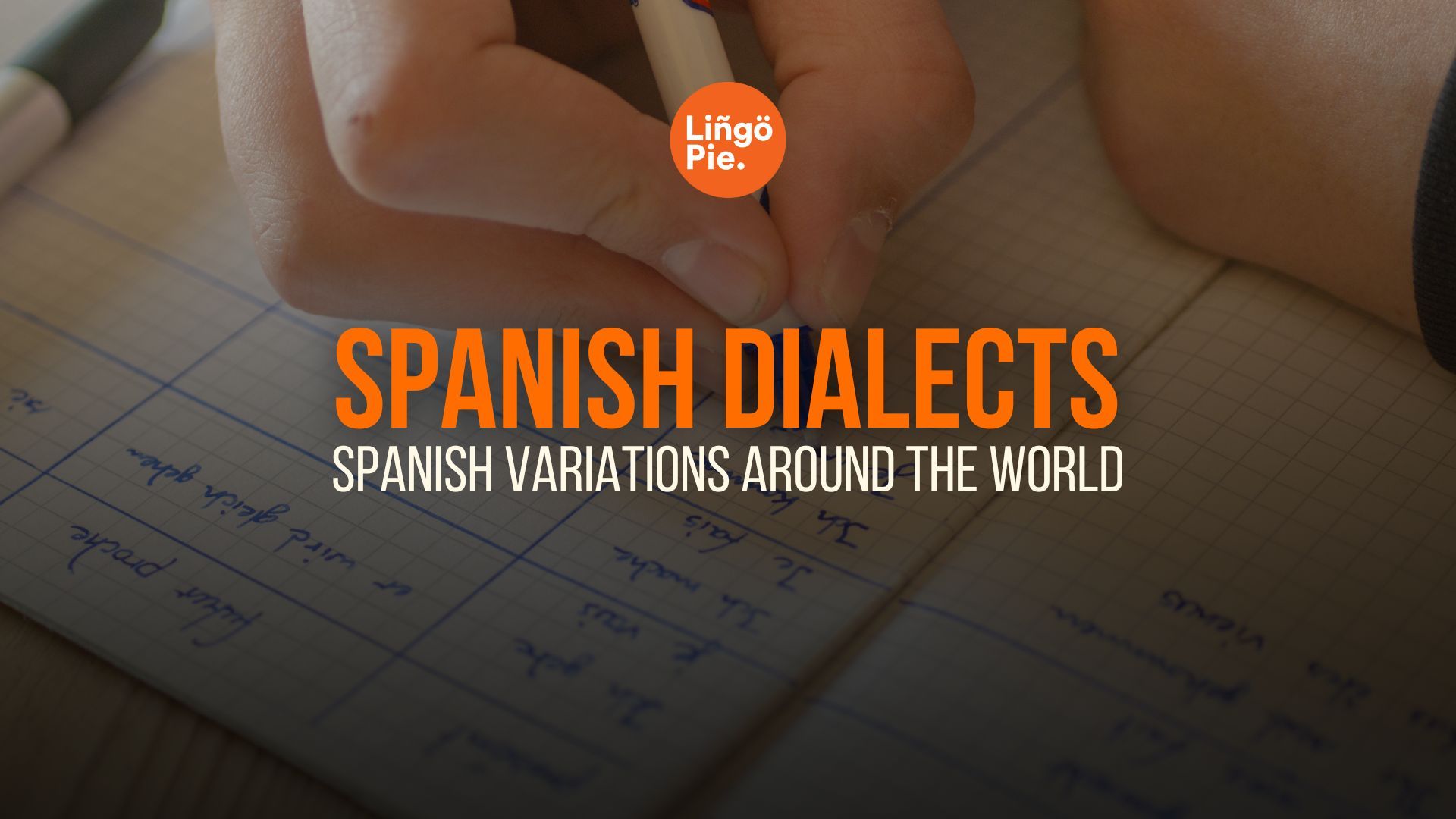If you want to learn to speak Italian like a native, while using slang words and phrases naturally, then you should watch Italian movies and TV shows that feature Italian native speakers. This is the best way to pick up authentic language use.
A great show for picking up Italian American slang words and culture is The Sopranos. This iconic series features standard Italian slang phrases as well as some slang words specific to the Italian community on the East Coast of America.
In this post, we will break down some common and useful Italian colloquialisms and explore how watching TV and movies can be a great way to develop your natural language skills.
Capisce? Let's get started!

Learning Italian by Watching TV and Movies
Getting to know Italian slang expressions and curse words from TV shows and movies is a great way to learn more about Italian culture, both in Italy and in Italian communities around the world.
Italian slang words and phrases are an essential part of sounding authentic and speaking like a native. For this reason, they are featured heavily in TV shows with Italian characters. Immersing yourself in these shows will allow you to absorb the language, and slang, in a natural way.
An excellent streaming platform for Italian shows and movies is Lingopie. This site is designed to help you learn Italian naturally by binging great TV. With Lingopie, you can use dual English and Italian subtitles, make flashcards of new vocabulary, and do quizzes on new words.
If you want to start speaking Italian like a local and less like you are reciting a textbook, start streaming great Italian TV today.
Italian Around the World
There are many Italian dialects in Italy alone. However, consider the fact that there is a strong Italian American community across the Atlantic with its own Italian expressions and pronunciations.
Depending on the TV show or movie you watch, you will be exposed to slang words and dialects connected with the local area. So, bear this in mind when choosing your next series.
Some parts of the country, such as Naples in southern Italy, are particularly known for thick accents and harder-to-follow dialects, especially for beginners.
The Sopranos is filmed mostly in English. It simply features the odd fun Italian slang word or phrase that you can pick up and start to use in context. This means it is super easy for beginners to follow and work out the meaning of phrases as they come up.
Below, we will list some handy and fun Italian slang words that you will come across regularly in The Sopranos as well as in other Italian TV and movies.

European Italian Slang
First, let's look at some common Italian slang terms, how to pronounce them and how to use them like a native speaker.
Italian pronunciation
While the focus of this guide to Italian slang words is not pronunciation, we will examine a couple of examples and write them out phonetically.
As a general rule, in order to master Italian pronunciation, remember to pronounce vowels strongly and clearly. Bear in mind also that ch is pronounced like "k", while the sounds ci and ce are said like "chi" and "che" respectively.
Let's look at the phrase meno male. This means "just as well", and it is pronounced like "meh noh mah leh". As you can see, all vowel sounds are spoken clearly.
Now, look at che figata! The actual meaning of this slang is "what a big fig", but figuratively it means "how cool!" This saying is pronounced like "keh fee gah tah", with the ch sounding like a hard "k".
Finally, you will already know the term for "hi" and "bye" in Italian, ciao. This greeting is pronounced "chow". Here, you can see an example of ci being pronounced like the English "ch" sound.

Italian Slang Phrases
As you'll see in The Sopranos, society in Italy is very social and family-oriented. So, you won't be surprised to learn there are lots of ways to ask someone how they are doing.
If you are meeting someone in person, complement your greeting of choice with a kiss on each cheek for the full Italian experience! You can use any of the following expressions when doing so:
- Che succede? - What's going on?
- Come stai? - How are you?
- Che si dice? - What's up?
- Come te la passi - How's it going?
To reply, you can say (non) molto bene, meaning "(not) very good".
Something you will hear Italians say all the time is va bene. This expression means "all right" or "okay". The literal translation of this charming phrase is "it goes well".
Craving for more native-sounding Italian phrases? I rounded up below some of the most common Italian slang phrases in The Sopranos and their English translations.
| Italian Slang Phrase | English Meaning |
|---|---|
| Che cosa stai facendo? | What are you doing? |
| Come stai? | How are you? |
| Mi fai schifo | You disgust me |
| Non ti preoccupare | Don’t worry |
| Ti voglio bene | I care about you / I love you (non-romantic) |
| Sono stanco morto | I’m dead tired |
| Mi sono rotto le palle | I’m fed up / I’m sick of it |
| Che palle! | What a pain! / What a drag! |
| Vai via! | Go away! |
| Non mi rompere | Don’t bother me / Don’t annoy me |
| Fatti i fatti tuoi | Mind your own business |
| Sta’ zitto! | Be quiet! / Shut up! |
| Ma che sei scemo? | Are you stupid? |
| Che cazzo vuoi? | What the hell do you want? |
| Lascia perdere | Forget it / Let it go |
| Che bella figura! | What a good impression! |
| Fa un culo così | Really pisses off (very angry) |
| Chi se ne frega? | Who cares? |
| Ti amo con tutto il cuore | I love you with all my heart |
| Dammi una mano | Give me a hand / Help me |
Fun Italian Slang Words
A lot of informal language in Italian is used in The Sopranos. Often, this is to express strong emotions, such as dismay or shock.
The stereotype that Italians speak passionately with their hands is only slightly exaggerated, after all!
Che palle is a great expression of dismay. It literally means "what balls!" but is better translated as "how annoying!"
Another great one is che schifo!, which means "how disgusting!"
Mi fa cagare is a hilarious and slightly stronger way to express distaste in Italian. This slang expression literally means "it makes me shit", but the figurative meaning is "it disgusts me" or "I really don't like it!"
If you want to express surprise at how someone is talking or acting, you might say fuori come un balcone . This expression literally means "out like a balcony", but it is used to call someone crazy.
When one of your Italian friends has bad breath, you could say mangi cadaveri! This is a slightly dark but logical phrase that means "you eat dead bodies". Note that this phrase is not widely used, and it is more common to say avere l’alitosi.
Finally, come il cacio sui maccheroni is such a hilariously Italian saying that it's hard to believe it is real. This Italian slang phrase means "like cheese on macaroni" and it is used to describe two things that are perfect for each other.
Looking for more? Here's a table of Italian slang words that are used in The Sopranos, along with their English meanings:
| Italian Slang | English Meaning |
|---|---|
| Amici | Friends |
| Bada bing | Easy as that / Simple |
| Capisce? | Understand? / Got it? |
| Gabagool | Capicola (type of ham) |
| Goombah | Close friend / Associate |
| Madone | Holy mother / Oh my God |
| Stugots | Testicles (vulgar) |
| Cugine | Cousin / Mafia associate |
| Fuhgeddaboudit | Forget about it |
| Paisan | Friend / Fellow countryman |
| Marone | Damn! / Holy Mary! |
| Moolinyan | Eggplant (racial slur) |
| Uffa | Ugh! / Expression of annoyance |
| Fanabla | Get lost! / Go to hell! |
| Cazzo | Damn / F**k (vulgar) |
| Va fa Napoli | Go to hell (literally: Go to Naples) |
| Stronzo | Asshole / Jerk (vulgar) |
| Che cavolo! | What the hell! / What the heck! |
| Mannaggia | Damn it! / Curse it! |
| Zitto | Be quiet / Shut up |
Translating English and Italian Idioms
When learning a foreign language, you will not always find a direct comparison for the idioms in your own language.
As you have seen with mi fa cagare, sometimes a slang expression stands alone and is not directly translatable. However, other times we can interchange an idiom in one language directly for one in another.
Take bocca al lupo, "into the wolf's mouth", for instance. This is an expression used to wish luck to a performer before they go on stage. It is used in exactly the same way as the English phrase, "break a leg".
Another fun example of mirroring idioms is avere le mani in pasta, which literally means to have a hand in the pasta, but figuratively it is the same as the English notion of having a finger in every pie or being involved in everything.
Finally, an important saying in the language of love: Amore a prima vista. Amore means "love" and prima vista means "first sight". So, this literally means "love at first sight" and it is used just the same as the English phrase.
Ready to express yourself better? Below is a table of Italian idioms that have been used in The Sopranos.
| Italian Idiom | English Translation | Meaning |
|---|---|---|
| Avere le mani bucate | To have holes in one’s hands | To be a big spender / To spend money recklessly |
| Andare a letto con le galline | To go to bed with the chickens | To go to bed very early |
| Non vedo l’ora | I can’t see the hour | I can’t wait / I’m looking forward to it |
| Avere un chiodo fisso | To have a fixed nail | To be obsessed with something |
| Essere al verde | To be at the green | To be broke / To have no money |
| Prendere due piccioni con una fava | To catch two pigeons with one bean | To kill two birds with one stone |
| Mangiare la foglia | To eat the leaf | To figure something out / To catch on |
| Mettere il bastone tra le ruote | To put a stick in the wheels | To cause trouble / To throw a wrench in the works |
| Avere la testa fra le nuvole | To have your head in the clouds | To be distracted / Daydreaming |
| Fare il passo più lungo della gamba | To take a step longer than your leg | To bite off more than you can chew |
| Essere in gamba | To be in leg | To be smart / To be on the ball |
| Chi dorme non piglia pesci | Who sleeps doesn’t catch fish | The early bird catches the worm |
| Non tutte le ciambelle riescono col buco | Not all donuts come out with a hole | Things don’t always go as planned |
| Avere la faccia tosta | To have a hard face | To be shameless / To have a lot of nerve |
| Essere fuori come un balcone | To be out like a balcony | To be completely crazy |
| Acqua in bocca | Water in your mouth | Keep it quiet / Don’t spill the beans |
| Non mi va | It doesn’t go to me | I don’t feel like it / I don’t want to |
| Essere una testa calda | To be a hot head | To be hot-tempered / Easily angered |
| Cadere dalla padella alla brace | To fall from the frying pan into the embers | Out of the frying pan, into the fire |
| Avere le spalle larghe | To have broad shoulders | To be able to handle a lot / To be resilient |
By learning these idioms, fans can gain a deeper appreciation of the characters' dialogues and the linguistic richness of Italian-American culture depicted in the series.

Italian American Slang
By this point, you have learned some witty, practical, and commonly used Italian slang expressions. Now, we will look at a handful of Italian slang phrases and words specific to Italian Americans and made famous by The Sopranos.
These sayings will be primarily used by Italian speakers using their own dialect within their community. So, bear this in mind before you march into a restaurant in New Jersey and demand a plate of gabagool. You'd probably prefer to sound more like Vito Spatafor than Michael Scott!
Gabagool
If you have ever watched The Office (who hasn't?!), you might have seen the episode in which Michael thinks an insurance man is an Italian Mafioso and tries to scare him by playing up to the Italian mob stereotype as you see in movies and series like The Sopranos. Part of this ridiculous act involves him ordering "gabagool" at a restaurant.
Gabagool is an Italian American word for the European Italian capocollo. This is a delicious cold cut of pork neck traditional in Italy. The word is made up of capo, meaning "head" and collo, meaning "neck", as the cut runs down the neck from the head of the pig.
Due to the pronunciation of capocollo by Italians with working-class dialects on the east coast of the U.S, the pronunciation gabagool developed and was made well-known by The Sopranos.
It has now become a trope in many shows and movies featuring Italian mafia characters.
Goomar
This is another Italo-American slang word that you might have heard in movies such as Goodfellas and Martin Scorsese's Casino and which also came into popular use after being featured on The Sopranos.
Just as with "gabagool", "goomar" is not actually an Italian word, but developed due to changing pronunciation over time. The colloquialism comes from the word comare, which means "godmother" in Italian.
In the context of Italian American mob men, it came to be used as a slang word for a mistress. The idea is that your mistress cooks for you, is at your beck and call, and looks after you without asking questions, like a mother figure, but with added obligatory sexual favors.
Marone!
This is another exclamation that you will hear frequently in The Sopranos and in context, it means "damn it!" Just as with the above examples of slang from the show, this too is actually a corrupted version of a standard Italian word.
In the south of Italy, it is common to say Madonna in a moment of shock or dismay, using the Holy Mother's name in vain. This is similar to someone exclaiming "Christ!" in English.
The Italian American community largely migrated from the south and this Italian slang word came with them.
The "d" sound in the Neapolitan dialect is often changed to an "r", and the ends of words are frequently dropped (eg. muzzadell for "mozzarella" and proshoot for "proscuitto").
So, we are left with Marone! As this exclamation originates from blasphemy, it carries quite a significant weight among the Catholic community in Italy. However, in Italian American communities, it is common and largely inoffensive.

FAQs: Italian Slang words and Phrases
What does the Italian slang word "Sfacime" mean?
This colloquialism comes from Sicilian slang. The verb sfaciare means to destroy, but in Sicily, the term sfacime came to mean "semen".
When this slang was brought overseas to the U.S, it began to mean "asshole". You can call someone a sfacime in an insulting or endearing way, just as you can call your friends "asshole" as a friendly joke.
What does "chooch" mean?
The word chooch is another bastardization of a word in Italian, ciuccio. In most of Italy, this means "pacifier", but in southern Italian slang, it means "donkey".
The southern Italian migrants to the U.S took this term and over time it became chooch. It is used to describe someone as stupid. Don't be a chooch!
What does "Scumbari" mean in Italian?
This is another classic slang term derived from the southern dialect. If someone looks a bit scumbari, they are disheveled in appearance.
Moreover, you can say non fai scumbari for "don't embarrass me".
What is the most popular Italian slang phrase?
Certainly, the most known and loved Italian slang phrase worldwide is Mamma mia! meaning "my goodness!" The phrase literally means "my mother".
It is not clear where this slang phrase originated, but it seems likely that it has something to do with the importance of the mother in Italy and in religion.
Learn Italian Slang with The Sopranos At Lingopie
In this post, we have covered several common Italian slang phrases used by native speakers, which also feature in the famous series The Sopranos. A great way to sound more proficient when speaking is to include these informal words in conversation.
Moreover, you are now familiar with some Italian-American language made popular thanks to TV shows. You can learn more about this slang by studying Italian TV shows like The Sopranos.
This is a fun and engaging way to pick up the natural use of Italian slang phrases and use this language authentically in the appropriate context.
For more entertaining TV shows in the Italian language, check out Lingopie, the streaming service that is designed to teach you a new language. Why not sign up to a 7-day free trial for all languages and test your Italian today?
See also: What Is the Best Way To Learn Italian on Your Own?
Mamma mia, che figata!
Ciao for now!







![How Many Italian-Speaking Countries Are Out There? [2025 Data]](/blog/content/images/size/w300/2025/06/Italian-speaking-countries.jpg)


